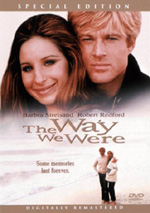

|
Reviewed by Van T. Tran
Columbia-TriStar, widescreen 2.35:1/16x9, languages: English DD 5.1 [CC] & Dolby Surround, subtitles: English, Spanish, Portuguese, Chinese, Korean, Thai, single side-dual layer, 28 chapters, rated PG, 118 min., $24.98, street date 12/14/99. Supplements:
Academy Awards: Winner of Best Song, Best Dramatic Score. Nominated for Best Actress-Barbra Streisand, Best Cinematography, Best Art Direction-Set Decoration, Best Costume Design, 1974. Directed by Sydney Pollack. Starring Barbra Streisand, Robert Redford, Bradford Dillman, Lois Chiles, Patrick O'Neal, Viveca Lindfors. Screen legends Barbra Streisand and Robert Redford make movie magic as the captivating star-crossed lovers Katie Morosky and Hubbell Gardiner. Theirs is a classic love story sparked by the attraction of opposites, played out against the backdrop of American life during times of foreign war, domestic prosperity and McCarthy-era paranoia in Hollywood. The Way We Were is a timeless romance that cannot be forgotten.
The film is presented at the original aspect ratio of 2.35:1 and anamorphically enhanced for widescreen sets on this dual-layered disc. For a 26 years old film, I am struck by pristiness of the transfer. The opening shot is undoubtedly the worst part of the picture - pale and grainy, but from that point on, the image quality is terrific. On some scenes, the picture seems to be a tad soft, but that is due to the filming process as explained by director Sydney Pollack on the commentary track. Such as the case of handheld camera on the dance floor when Pollack needed to follow the steps for closeups. I also detected a slight shift of color saturation on a couple of scenes. Otherwise, colors remain fully saturated and vivid. Blacks are deep and shadow details are well defined. Images are sharp, detailed, and clean, except for a few scenes as mentioned above. As for flesh tones, I won't go as far as to say that it doesn't look natural, but even without knowing the age of the film, you can tell that it is not recently filmed. The remastered DD 5.1 soundtrack uses the rear surrounds sparingly and only for ambient effects. The majority of the soundtrack involves the three front channels for a very pleasing experience due to the film score and music. And it is impossible to talk about the film and not mentioning the title song sung by Barbra Streisand, lyrics by Alan and Marilyn Bergman, and composed by Marvin Hamlisch. I think that over the years, the audiences come to remember the Oscar-winning song more than anything else about the film. This is an instance where the simple melody of "The Way We Were" upstages the acting, the writing, and the directing. Take away the song and the audiences are left with a competently made film, but not to the degree of heartfelt sentiment as so eloquently expressed by the lyrics and the melodies. The score throughout the film uses the familiar passages of the song that I found quite enjoyable. To me, Hamlisch's composition nearly reaches the overflowing sentiments of John Barry's marvelously evocative and utterly romantic score of Somewhere in Time, but not quite. The encoded DD 5.1 soundtrack presents the score and music with natural fidelity, and dialogue, while always intelligble, is a bit harsh. The supplemental materials bring back the memories and significations of the film through the filmmakers. The highlight is the new making-of documentary "Looking Back," with appearances by Streisand, Pollack, Hamlisch, the Bergmans, and author Arthur Laurents. It is interesting to note that there are some controversies surrounding the film and not everyone is happy with the way it is. Author Arthur Laurents, while respect Pollack's decisions on rewrite, feels that the film is not as faithfully adapted as he would prefer. Barbra Streisand isn't very happy about some of the deleted scenes that she feels would better develop the story. We are shown 7 deleted scenes, most of which involve Streisand's character. Pollack defends his decisions and is happy with the final version, but does feel in hindsight that some improvements could be made. The most glaring omission on this interview is Robert Redford. It would be interesting to get his perspective. The second half of the 60 minutes segment shifts the discussion to the song and the score. Because I love film score, I found this discussion to be the most interesting as Hamlisch explains and demonstrates between the various compositions before settling to the version heard on the film. Likewise, it is interesting to note that there is a more complex version of "The Way We Were" and that Streisand sung it once in a concert. I wonder how it sounds like. The other essential extras is the commentary track provided by Pollack. The director tried to recall the making process and experience of the film, but since it's been a while, the commentary has plenty of empty spots. Unless you are a big fan of the film, the documentary is suffice in providing insights. Other bonuses include trailers of Streisand's films, the standard talent files and production notes from Columbia-TriStar. I would not hesistate to recommend this DVD with the well produced supplemental materials to fans of the film. I thoroughly enjoyed the documentary piece. However, I didn't find the film to be extremely compelling, despite a strong cast and a well written screenplay. If you haven't seen The Way We Were, rent it first and see if you feel otherwise.
Previous: Halloween H20 | Back to Main Page |